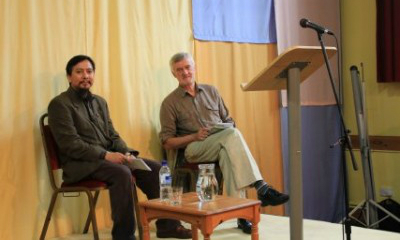The Indian Poet, Mohan Rana, has lived in England for the past twenty years. Born in Delhi in 1964, after studying Humanities he contributed reviews and articles on the arts to Hindi newspaper and magazines. Although based in in England he has continued to write and publish in his mother tongue, Hindi, producing six, highly acclaimed, collections of poetry, most recently Dhoop Ke Andhere Mein (In the Darkness Of The Sun, 2008)
Perhaps it’s this distance from his native country that has contributed to his poems’ most striking characteristic: their Absolut refusal to accept anything at face, their persistent – questioning of reality:
Does fish too drink water?
Or the sun feel hot?
Does light too see darkness?
Does rain too always get drenched?
Do dreams too ask questions about sleep like I do?
He asks in ‘After Midnight’.
Yet behind this apparent naivety lies a deep layer of complex philosophicaland literary inheritance. The quality of Advaia or ‘non-dualism’ – the essence of the ancient scriptures of the Upanishads – permeates Mohan Rana’s poetry, giving rise to its persistent questioning of identity, truth and reality. Other poems are influenced by Buddhism; for example, ‘Not What the Words…’ which, in its reflection on the creative process, suggests that meaning is not to be found in the word’s themselves, but that it already inhabits the reader since, in Buddhism, reality has a cyclical nature. In this, the poem echoes the Buddhist doctrine of the chain of the dependent origination: all experiences in life are processes subject to causation, this world being the last link in the chain of causation.
What gives Mohan Rana’s poetry its magnetic quality is that, despite its philosophical profundity, his work is vividly accessible, even to those readers new to Indian philosophy and religion. His themes are universal and they are conveyed through simple resonant images.
By Lucy Rosenstein From her introduction to Mohan Rana’s Chapbook.




